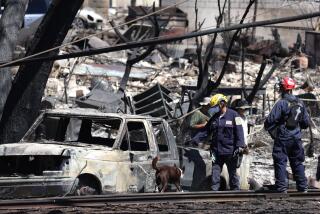U.S. Troops Step Up Hunt for Insurgents in Afghanistan
As hundreds of U.S. and Afghan soldiers hunted insurgents along the rugged border with Pakistan, the U.S. ambassador here predicted Tuesday that Taliban and other guerrillas would intensify their attacks in coming weeks.
The troops, numbering about 2,000 and backed by air power, are carrying out what the military calls its largest operation in Afghanistan since the Taliban was overthrown two years ago. The mission, called Operation Avalanche, is aimed at smoking out Taliban fighters and their allies with multi-pronged assaults in eastern and southern Afghanistan before winter sets in.
The operation, which began Dec. 2, is the latest in a string of military efforts along Afghanistan’s border with Pakistan, where guerrilla attacks have steadily increased.
“Under the current circumstances, we want to take the war to them, to keep them busy defending and protecting themselves,” U.S. Ambassador Zalmay Khalilzad told reporters here. “We are not losing. I’m saying that I anticipate that they are becoming more active against people who are coming here to help Afghanistan stand on its own feet.”
In an attack Monday, a Pakistani engineer was killed and his Afghan driver wounded on the highway between Kabul and the southern city of Kandahar, a showpiece reconstruction project largely funded by the U.S.
Another Pakistani engineer was missing and two escaped after another recent attack in Ghazni province. Militants killed a French woman working for the United Nations last month.
Delegates to the loya jirga, or grand assembly, that will decide Afghanistan’s new constitution have begun arriving in Kabul, the capital, and the U.S. military has said intelligence suggests that militants will launch attacks to disrupt the meeting.
There is no firm starting date for the assembly, which was supposed to convene in October. Officials say it won’t begin as scheduled today.
Privately, Afghan officials say there are various reasons for the delay, including disputes over the legitimacy of some of the 500 delegates and travel difficulties.
Afghan President Hamid Karzai is also said to be using the delay to shore up support for the draft constitution, which proposes a strong presidency governing with a two-chamber parliament. Some opponents want a more powerful legislature or stronger guarantees that Afghanistan will be ruled by Islamic law.
Asked about a report that U.S. and other diplomats, hoping to split the Afghan insurgency, have held secret meetings in Kabul with four commanders of renegade warlord Gulbuddin Hekmatyar’s militia, Khalilzad did not explicitly deny that such talks had taken place.
“I have not met with them myself,” he said.
Hekmatyar’s Hizb-i-Islami, or Islamic Party, is on the State Department’s list of international terrorist organizations, and an executive order led Washington to declare Hekmatyar a global terrorist in February.
Many Afghans regard Hekmatyar and his commanders as war criminals suspected in thousands of abductions, rapes and killings before the Taliban seized control in 1996.
“There has to be, obviously, accountability with regard to crimes against humanity and crimes against the Afghan people and terror,” the ambassador said. “But Afghans also have to reconcile and move forward.
“You need accountability for past mistakes, but peace and progress also requires reconciliation at some point. There has to be a balance.”
Anger over civilian deaths in a series of U.S. airstrikes has added to a feeling of alienation in Pushtun areas, further complicating the debate over the draft constitution. Pushtuns are the country’s largest ethnic group.
Today, the U.S. acknowledged it had killed six children in an attack aimed at a renegade Afghan commander, bringing to 15 the number of youths mistakenly killed in less than a week, Associated Press reported.
The children died in a night raid Friday near the eastern city of Gardez, said Lt. Col. Bryan Hilferty. Warplanes and troops were involved in the attack, said Hilferty, who added that the U.S. “had no indication there were noncombatants” in the area.
Nine children died Saturday when a U.S. warplane attacked the village of Hutala, in Ghazni province. U.S. officials said the target was a Taliban militant, Mullah Wazir, suspected of killing two foreign workers rebuilding the highway. But villagers said Wazir escaped, and Khalilzad backed away Tuesday from his statement that Wazir had been killed.
More to Read
Start your day right
Sign up for Essential California for news, features and recommendations from the L.A. Times and beyond in your inbox six days a week.
You may occasionally receive promotional content from the Los Angeles Times.






